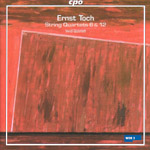The Sixth is the earliest surviving of Ernst Toch’s String Quartets, dating from 1905 when the composer was but 17 years old. Nonetheless, it displays a remarkable maturity and command of compositional technique. The quartet is very much a product of late Romanticism, and it bears its Brahmsian influence quite heavily, particularly in the first two movements, which evoke an Old World lyricism and sweetness that’s almost cloying. The Andante doloroso at last provides some darker contrast in its middle section, while the Molto vivace finale makes for a stirring ending to this admirable but somewhat over-congenial work.
Three decades later we confront a very different Toch in the String Quartet No. 12. After emigrating to the United States in 1933, Toch composed very little until the end of World War II. The terse, angular harmonic language of this new quartet reflects not only Toch’s embrace of 12-tone harmony, but also the emotional upheaval he experienced during the war years. The music casts an overall gloomy atmosphere despite the strong emphasis on meter and rhythm throughout the four movements. As usual the composer impresses with his brilliant contrapuntal technique and mastery of colors and timbres. Listen to how he skillfully employs mutes and pizzicato in the third movement “Pensive Serenade”, which, with it’s shards of a lyrical melody, seems an oasis in the surrounding arid musical landscape. As with Toch’s other later quartets, the Twelfth is strong on visceral physicality, and while it does not fall easily on the ear, focused and repeated listening will provide much intellectual satisfaction. The Verdi Quartet once again delivers passionately committed and technically assured performances that make a strong case for the composer. However, the cloudy, over-reverberant recording is a step back from the high quality of the previous discs in this series.
































